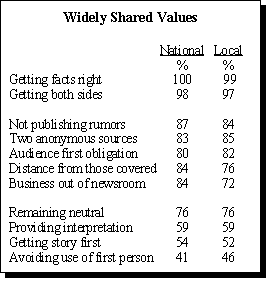Journalists and news media executives across mediums and markets are united in what they think defines journalism, saying accuracy and balance in reporting represent the essence of journalism. And described in their own words, many in the profession agree that journalism is distinguished because of its contributions to the public and its impact on society.
The news media overwhelmingly see journalism as a watchdog against corruption and abuse and believe this effort keeps public officials from committing wrong. But, in a reversal since the mid-1990s, journalists and news media executives share public unease about the way they play the watchdog role. Today, 45% of the national news and 39% of the local media say the press drives controversies with its coverage of the personal and ethical behavior of public figures.
What Makes It Journalism?

When asked to describe in their own words what distinguishes journalism, most journalists and news media executives mention its contributions to and impact upon society, including providing the public with information.
While this is true of executives and working journalists, some differences of opinion can be discerned across mediums and markets. More people in national television news mention providing the public with information and news (45%) than do those in national print (29%).
“It is an opportunity to give information that can change or even save people’s lives,” says a local news weatherman.
The local print media are particularly sensitive to their profession’s power to influence: 30% say journalism is distinguished by its influence (such as shaping opinion or making things better in the community, country and world). By contrast, influence is mentioned by only 16% of those in local television and 19% and 22% of those in national print and television, respectively.
“You have a chance to make things better and actually go out and put up a stink about things that need to be pointed out,” says a deputy metro editor on a midwestern newspaper.
The personal benefits and satisfaction afforded by a career in journalism are mentioned as unique qualities of the profession less often, although working journalists are more likely than news media executives to mention them.
Core Principles?

The news media — journalists and executives alike — largely agree on the core principles of journalism, which include getting the facts right, getting both sides of the story and not publishing rumors.
“The nature of journalism is to seek the truth,” says the assistant managing editor of a mid-sized city paper.
Differences between news media groups emerge, however, on other commonly held principles. For example, although more than 80% of those in television news consider remaining neutral a core principle, only 68% of those working in national and local print journalism agree. The principle of providing at least two anonymous sources finds somewhat more support among those in television than those in print.
Maintaining some distance from the people they cover and keeping business out of the newsroom are more important to the national media than the local media — 84% in national news think that both are central to journalism, compared to 76% and 73%, respectively, in the local press.

There is a division of opinion on the principle of getting the story first: Roughly half of the news media consider it integral to journalism, with more of those in print than television saying this is a core principle. This is especially true in local markets, where 64% in print agree but just 41% in television do so. Within local news organizations, more of those in the newsroom say getting the story first is important: 63% of working journalists identify it as a core principle, compared to 39% of news executives.
Those in print and television disagree sharply over whether the press should interpret the news for the public. More than two-thirds of the print press say that providing an interpretation of the news is a core principle, compared to less than half of those in television.
Cross Pressures
There is widespread agreement that journalism is simultaneously a business, a public service and a watchdog. Three-quarters of those in national and local news agree that journalism is accountable to shareholders just like any other business. Eight-in-ten say it is a public service that provides information to citizens for self-governance. And more than eight-in-ten in national and local news say journalism is a watchdog against corruption and abuse.
“It’s an incredible combination of public service, craft and ego gratification,” says a national newspaper editor.
Differences can be found in the number who say these qualities describe journalism very rather than fairly well. For instance, 40% of those in local print say that journalism is described very well as a public service for providing information to the public, compared to 28% in national print and about 20% national and local television.
While the national and local media agree that modern day journalism serves as a watchdog against corruption and abuse, those in print and broadcast hold slightly different views. Both the local and national print media are almost twice as likely as those in television to say that journalism is described very well as a watchdog: 31% in national print and 39% in local print, compared to 18% and 17% in national and local television, respectively.
Objectivity Upheld
There is overwhelming consensus among journalists and news media executives that it is possible to obtain a true, accurate and widely agreed upon account of an event. Roughly three-quarters of those in the national and local news media say this is an achievable task. Only a small number of those in local broadcast (25%) and the Internet (26%) think that perceptions of an event are so personal that it is impossible to get a true and accurate account.
Additionally, there is widespread support for the feasibility of developing a systematic method to cover events in a disinterested and fair way. Over two-thirds say that such an approach is possible. In this instance, however, journalists under age 35 stand out as less supportive. While a majority (61%) still expresses faith in such a method, a substantial minority has doubts.
Who are the Journalists?

Given the general agreement within the news media on values and core principles, it is not surprising that there is similar agreement on who they think is and is not a journalist. Nearly everyone agrees that David Broder and Tim Russert are journalists, for instance. And Arianna Huffington, Rush Limbaugh, George Stephanopoulos, Don Imus and Howard Stern are not, according to the press.




